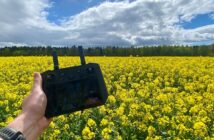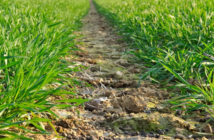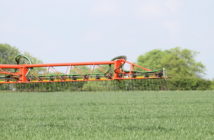Wales’ first regenerative seaweed and shellfish farm is inviting British farmers to trial a new seaweed biostimulant as part of a wider commitment to sustainable land-sea farming and collaboration.
The Pembrokeshire-based Community Benefit Society practices Integrated Multi-Trophic Aquaculture (IMTA) — a method of farming that mimics natural ecosystems by combining seaweed and shellfish to recycle nutrients, filter water and boost biodiversity without synthetic inputs.
Now, Câr-y-Môr is bringing the benefits of this fast-growing crop back to the soil by developing and refining products for farmers, such as its seaweed biostimulant.
Early trial results showed a 24% yield increase on organic potatoes. Similarly, a silage field trial saw an 18% yield increase (equivalent to £92 per hectare uplift) when the biostimulant was added to the existing fertiliser programme.
Ceredigion beef and sheep farmer, Daniel Evans, was one of the trialists. “We used the biostimulant on around 1.5 acres in total, with a portion of the fields left untreated to compare results, which I was very pleasantly surprised by. When the grass was weighed, the area where we had used the biostimulant showed an 18% increase in yield — pretty concrete evidence of its positive impact,” he said
Now, Câr-y-Môr is asking more farmers to register their interest. Câr-y-Môr director Dom Burbridge, who is heading up the farmer-led trials, added: “The use of seaweed on land isn’t a new concept. Generations before us fished locally and spread seaweed on fields to nourish the land, and Câr-y-Môr is continuing those traditions — with a few modern updates — to leave the Welsh seas and soils healthier than we found them.
“The biostimulant is easy to apply and can be used throughout the year from early growth; giving farmers a practical, readily available, cost-effective alternative to synthetic inputs. And because we only need to apply relatively low volumes, drone spraying is a viable option for giving crops a quick and efficient boost in situations where farmers can’t get onto their fields — due to water logging, or on steep hillsides, for example.
“I would really encourage farmers to speak to their agronomist about the trial and the benefits of using a seaweed biostimulant. Together, regenerative farming and Welsh fishing have the potential to develop a £105 million regenerative sea farming industry which could generate up to 1,000 jobs in coastal and rural communities — boosting the Welsh economy, putting nutritious local food back on our tables and enhancing sea and soil health for future generations.”
Farmers keen to trial the biostimulant or register their interest should visit: Seaweed Biostimulant | Fertiliser — Câr-y-Môr




